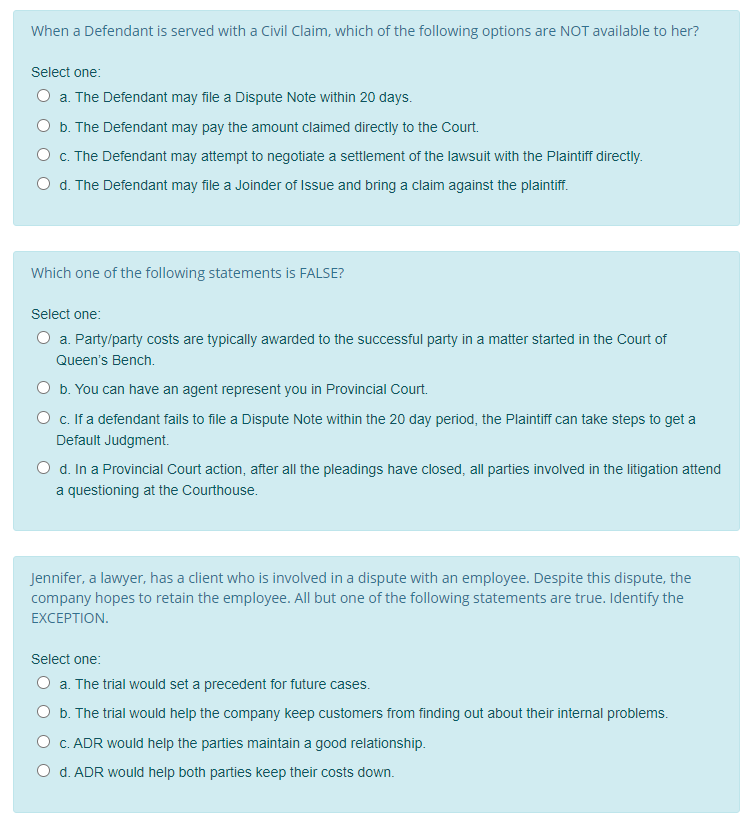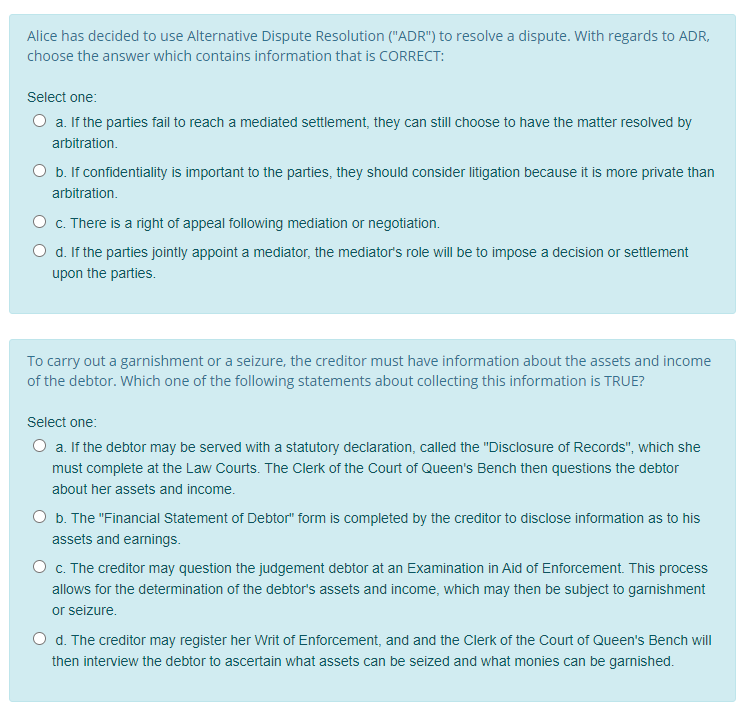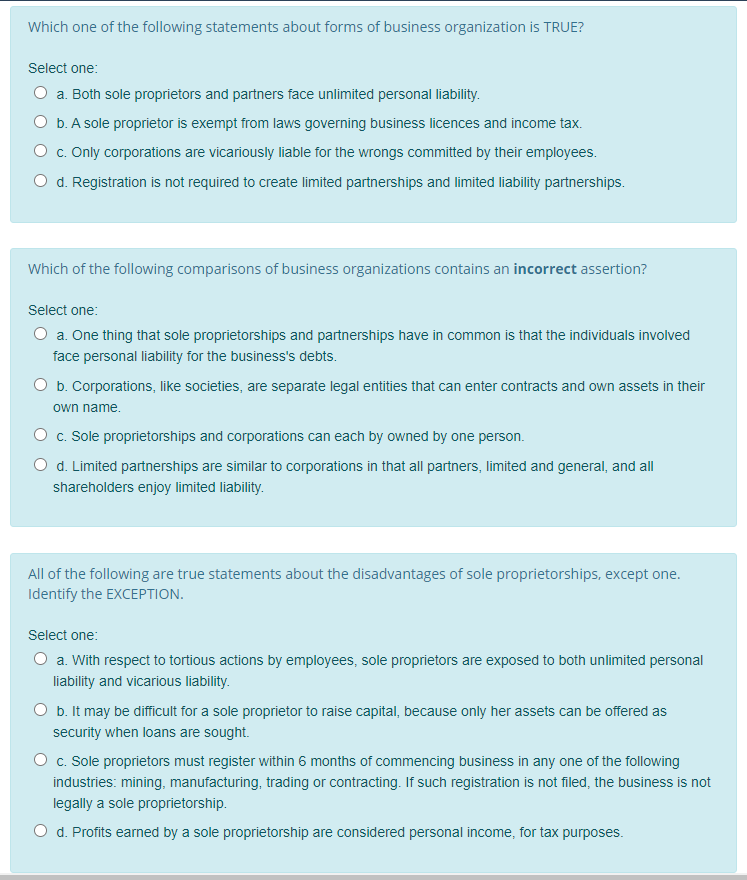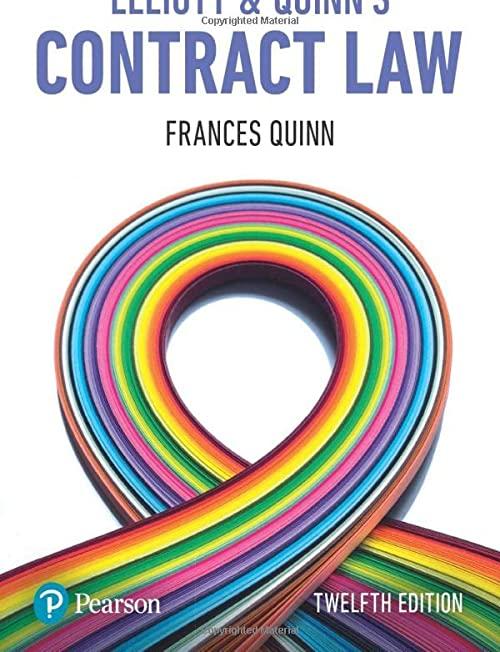


don not really need explanation. thanks
When a Defendant is served with a Civil Claim, which of the following options are NOT available to her? Select one: O a. The Defendant may file a Dispute Note within 20 days. O b. The Defendant may pay the amount claimed directly to the Court. O c. The Defendant may attempt to negotiate a settlement of the lawsuit with the Plaintiff directly. O d. The Defendant may file a Joinder of Issue and bring a claim against the plaintiff. Which one of the following statements is FALSE? Select one: O a. Party/party costs are typically awarded to the successful party in a matter started in the Court of Queen's Bench. O b. You can have an agent represent you in Provincial Court. O c. If a defendant fails to file a Dispute Note within the 20 day period, the Plaintiff can take steps to get a Default Judgment. O d. In a Provincial Court action, after all the pleadings have closed, all parties involved in the litigation attend a questioning at the Courthouse. Jennifer, a lawyer, has a client who is involved in a dispute with an employee. Despite this dispute, the company hopes to retain the employee. All but one of the following statements are true. Identify the EXCEPTION. Select one: a. The trial would set a precedent for future cases. O b. The trial would help the company keep customers from finding out about their internal problems. O c. ADR would help the parties maintain a good relationship. O d. ADR would help both parties keep their costs down.Alice has decided to use Alternative Dispute Resolution ("ADR") to resolve a dispute. With regards to ADR. choose the answer which contains information that is CORRECT: Select one: a. If the parties fail to reach a mediated settlement, they can still choose to have the matter resolved by arbitration. O b. If confidentiality is important to the parties, they should consider litigation because it is more private than arbitration. O c. There is a right of appeal following mediation or negotiation. O d. If the parties jointly appoint a mediator, the mediator's role will be to impose a decision or settlement upon the parties. To carry out a garnishment or a seizure, the creditor must have information about the assets and income of the debtor. Which one of the following statements about collecting this information is TRUE? Select one: a. If the debtor may be served with a statutory declaration, called the "Disclosure of Records", which she must complete at the Law Courts. The Clerk of the Court of Queen's Bench then questions the debtor about her assets and income. b. The "Financial Statement of Debtor" form is completed by the creditor to disclose information as to his assets and earnings. c. The creditor may question the judgement debtor at an Examination in Aid of Enforcement. This process allows for the determination of the debtor's assets and income, which may then be subject to garnishment or seizure. O d. The creditor may register her Writ of Enforcement, and and the Clerk of the Court of Queen's Bench will then interview the debtor to ascertain what assets can be seized and what monies can be garnished.Which one of the following statements about forms of business organization is TRUE? Select one: a. Both sole proprietors and partners face unlimited personal liability. b. A sole proprietor is exempt from laws governing business licences and income tax. c. Only corporations are vicariously liable for the wrongs committed by their employees. O d. Registration is not required to create limited partnerships and limited liability partnerships. Which of the following comparisons of business organizations contains an incorrect assertion? Select one: O a. One thing that sole proprietorships and partnerships have in common is that the individuals involved face personal liability for the business's debts. b. Corporations, like societies, are separate legal entities that can enter contracts and own assets in their own name. c. Sole proprietorships and corporations can each by owned by one person. O d. Limited partnerships are similar to corporations in that all partners, limited and general, and all shareholders enjoy limited liability. All of the following are true statements about the disadvantages of sole proprietorships, except one. Identify the EXCEPTION. Select one: a. With respect to tortious actions by employees, sole proprietors are exposed to both unlimited personal liability and vicarious liability. O b. It may be difficult for a sole proprietor to raise capital, because only her assets can be offered as security when loans are sought. c. Sole proprietors must register within 6 months of commencing business in any one of the following industries: mining, manufacturing, trading or contracting. If such registration is not filed, the business is not legally a sole proprietorship. O d. Profits earned by a sole proprietorship are considered personal income, for tax purposes












